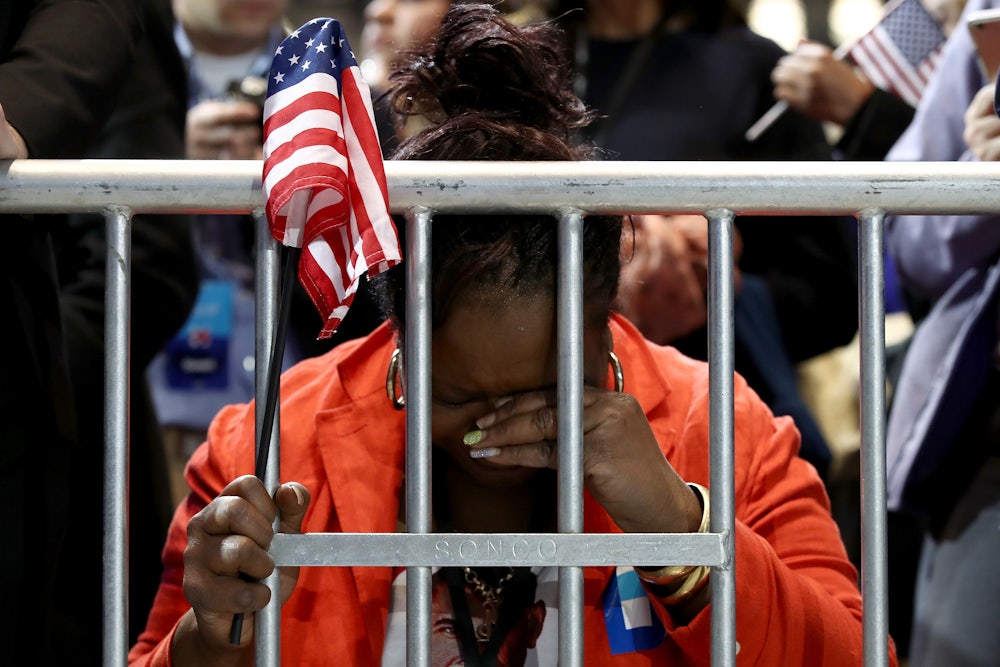A few days before the election, I told my daughter why her school would be closed on Tuesday.
“Obama is leaving soon,” I said. “We have to pick a new president.”
I waited a beat, unsure of how much more I should say. We have never discussed elections, even though she’s been in tow while I’ve voted in them. She is six but not yet politically aware, and that is my deliberate choice. I have my reasons for leaving her out of the loop on this. Raising a black daughter—one with special needs, for whom the pleasure of complex conversation has been hard-won—has meant making daily decisions about which lessons to impress upon her early—say, about kindness and navigating bullying—and those that will simply have to wait.
But I kept talking, anyway. I couldn’t help myself.
“We have to pick a new president,” I repeated, “and it might be a woman!”
She perked up. “I am a woman!”
I didn’t expect her to make so immediate a connection. I had, as I often do, underestimated all that she’s able to understand.
My daughter was born two years into the Obama administration, but I didn’t tell her much of anything about the first family. I didn’t know how to explain the historicism of their victory without also explaining the dogs and the fire hoses, the billy clubs and the bridge, the gutting of the Voting Rights Act, passed all those decades ago, to end the same voter suppression that has persisted through the eight years of Barack Obama’s tenure. For me, these events are inextricable.
I also didn’t know how to tell my daughter that when Obama’s era ended, the next election would probably be a race between white people—and how, when white people race toward the highest office in the land, black voters can’t believe anything they promise us on the campaign trail. They are known to neglect and even outright renege on those promises, once they have our votes.
How could I introduce that sort of suspicion into her life at so young an age? How had I forgotten that I might need to?
The experience of a black presidency is normal for my daughter and unprecedented for me, and I never knew where we were headed from here. I wanted to preserve her sense of normalcy for as long as I could, and I’ve had no real power to do so beyond that which is attached to my vote.
I woke up early yesterday, buoyed by the prospect of electing a historic successor for a historic leader—a woman with whom my daughter identified. At 6:45 a.m., a line of predominantly black voters snaked through the corridor of my polling center in Maryland. My fellow voters seemed similarly energized. We were jovial, determined, proud. Because we’re a blue state and I live in a very blue precinct, I am always lulled into a false sense of confidence about the country’s values. In my neighborhood, amid the beautiful unifying energy at my poll, I tend to believe the best about America—just fleetingly, while we’re there, setting our intentions toward racial and gender progress.
We did not know that morning that so many people in so many other states would set their intentions elsewhere, backing a candidate who openly opposes legislative measures that would protect women, blacks, Latinos, indigenous, and Islamic people, and low-income communities.
We didn’t know then that our children would not see the next four years governed by someone who wasn’t a white male conservative.
I do not regret the brief exchange I had with my child about the possibility of a woman president. And as a black woman who grew up with only white male presidents, I can probably prepare her for some of what that will be like for us in the years to come. But some of this will be new to us both. Neither of us has lived in a post-black presidency before, an America that convincingly backed a bigoted candidate over a woman who spoke out about implicit bias. Neither of us has lived in an America ruled by a man who has bragged about committing sexual assault and wants to ban immigrants based on their religion or nationality.
But there are people we can ask about this. We need only to consult the same elders who never thought they’d live to see a black, self-professed feminist hold the country’s highest office. We can ask them what it’s like to live under a truly oppressive regime, where the leader of the free world—and the people he appoints to similarly powerful positions—doesn’t think twice about redefining the country’s hard-won definitions of freedom. I am sure they can tell us all that we need to know, and we will hold one another as we listen.
